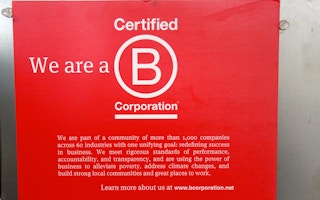At the recent AVPN Conference held in Bangkok, a conversation that was – and, is still – alit with buzz arose during the panel discussion, “Creating Businesses for Social Good”. Most pertinently, the discussion revolved around B-Corp certification and how it drives more socially responsible business.
B Corp certification is a stamp of recognition given by non-profit B-Lab that certifies corporates as having met rigorous standards of social and environmental performance, accountability, and transparency, and represents a legal commitment to all stakeholders. Currently, over 50,000 companies in more than 50 countries use B Lab’s standards to manage their impacts, of which over 2,000 are Certified B Corporations.
Panellists at the conference agreed that B Corp certification supports the adoption of the Impact-Business Model (IBM), the business model underpinning all for-profit organisations that meet B Lab’s standards.
Through the session, I gathered four ways that B Corp certification can be a collaborative tool to inspire businesses to work toward common goals.
1. Paves the movement toward IBM
On an individual company level, the IBM guides each company to solve big picture issues through its operations or products i.e. alleviating poverty by creating a fair trade supply chain. However, in an impact-business ecosystem, the general consensus by the panellists was that the B Corp certification provides a shared community for certified organisations and inspires a movement toward an impact-business model.
Kim Jeongtae, chief executive officer of Merry Year Social Company, put forth during the discussion that B Corp certification performs the role of a “new currency” that speaks to wider stakeholders as certified companies have passed standardised performance measurements.
Fellow panellist Jaff Shen, chief executive officer of Leping Social Entrepreneur Foundation suggested that certification opens doors to highly driven collaborations as a result because these B Corps have already been guaranteed that rigorous standards have been met.
2. Nurtures leaders in the industry
If organisations aim to be leaders in their industries, it is important for businesses to embrace society and be a force for good, said Corey Lien, co-founder and vice chairman of Asia Pacific B-Corp Association. B Corp certification can provide them with a competitive edge as consumers are increasingly looking for brands that support social issues that communities identify with while employees are looking to work for companies that make a difference in society, he said.
Alex Hannant, chief executive of Akina Foundation, coming from a sector-building perspective, emphasised that the B Corp certification can be a “driver for efficiency” to scale social change. An example that was raised during the session was how Unilever, with wholly owned B Corp subsidiaries, like Ben & Jerry’s, under its portfolio, can leverage on them to set the standards as one of the leaders in their field driving sustainability and contributing to the B Corp movement.
On the other hand, novices coming into the field who possess B Corp certifications can establish common grounds with key players in the industry, as certifications grant them credibility in the eyes of consumers and potential investors.
3. Strict standards to uphold
However, Lien also cautioned that attaining the B Corp certification does “not simply come with perks”. As organisations are required to undergo a two-year renewal process in order remain within the B Corp community, it is necessary for them to maintain strict standards for themselves.
As a result, organisations are always looking for ways to innovate to meet B Corp’s fundamental requirement, that is, to embody the IBM.
Hannant concluded that, “even if one does not get the certification, organisations should still go through the process… to help them understand where they are now, and where they want to be at in the future”.
In other words, B Corp certification is not only an assessment framework, but also an awareness-raising tool that highlights gaps where companies are failing to meet standards and thus, tackle these issues accordingly.
4. Creating common language and undertaking due diligence
Though the B Corp movement started in the United States, it is causing a systemic borderless ripple effect within supply chains, industries and ecosystems, particularly in Asia. Not only does possessing B Corp certifications enable a common language among organisations committed to make an impact, thus creating a highly integrated ecosystem, the certifications are useful measures for potential investors because due diligence has been guaranteed.
As a result, Kim and Shen have professed eagerness to promote the B Corp movement in Korea and China respectively. However, the panellists agreed that government structures are still too rigid for corporates in Asia, and central and municipal governments need to take the lead in order to maximise untapped potential because Asia is undoubtedly a fertile leading economy.
The session also covered pertinent questions such as B Corp’s impact assessment criteria, which can be found in the session report. Other key sessions and workshops during the Conference included themes on education, women empowerment, and the Continuum of Social Investing.
The Singapore situation
Following the AVPN Conference, I was curious to learn more about the B Corp movement in my own back yard of Singapore. To a large extent, the global B Corp impact-business momentum has driven the development of the first few B Corps in Singapore, which started in 2015. There are now five B Corps in Singapore and at least another 10 that are on their way to attaining B Corp certification.
As a small, open-border city state, Singapore takes a serious approach to navigating through the opportunities and challenges of globalisation. Fully cognisant of the risks of income inequality, poor governance and environmental degradation to a prosperous nation, the Singapore government has, in recent years, taken a heightened interest in “future-proofing” its economy.
This is why the B Corp movement is uniquely positioned to accelerate the culture shift to a more inclusive and sustainable Singapore economy.
Amanda Kee is Senior Marketing Associate at Asian Venture Philanthropy Network.


















